-
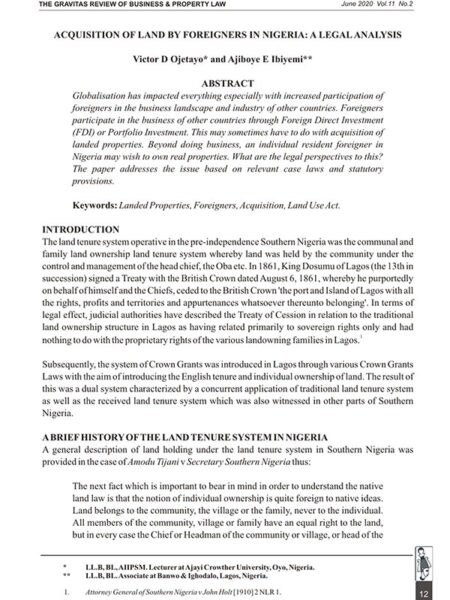
Acquisition of Land by Foreigners in Nigeria: A Legal Analysis
0₦2,500.00Victor Ojetayo of the Ajayi Crowther University Oyo Nigeria and Ajiboye Ibiyemi in their article, Acquisition of Land by Foreigners in Nigeria: A Legal Analysis, note that with the increased participation of foreigners in Nigeria’s economic landscape through Foreign Direct and Portfolio Investments, resident and non-resident foreigners may wish to own real property in Nigeria. Ojetayo and Ibiyemi present an exposition of relevant case laws, the Land Use Act, Acquisition of Land by Alien Law and other statutes for their perspective on acquisition of land by foreigners in Nigeria.
-
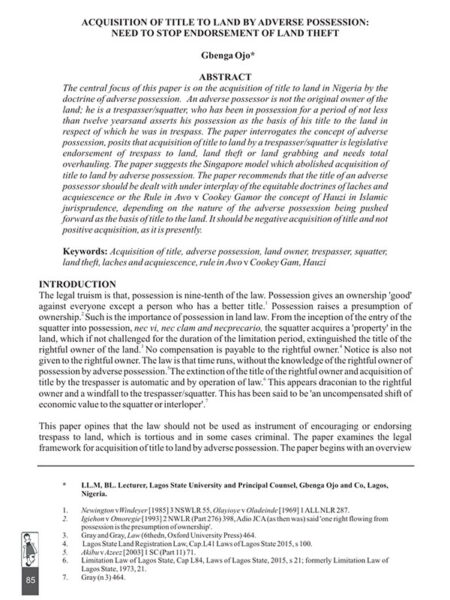
Acquisition of Title to Land by Adverse Possession: Need to Stop Endorsement of Land Theft
0₦2,500.00Gbenga Ojo, Lagos State University and Principal Gbenga Ojo and Co Lagos Nigeria in his article, Acquisition of Title to Land by Adverse Possession: Need to Stop Endorsement of Land Theft, interrogates the concept of adverse possession in land law. He posits that acquisition of title to land by a trespasser/squatter by adverse possession is tantamount to land theft. He argues that the claim of an adverse possessor rather than being dealt with under limitation laws should be taken care of by an interplay of the equitable doctrines of laches and acquiescence or the Rule in Awo v Cookey. He recommends a reform of the law and the adoption of the Singaporean model which abolished acquisition of title to land by adverse possession.
-
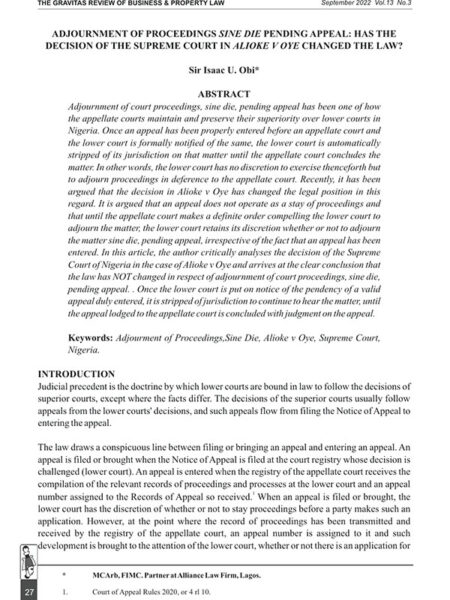
Adjournment of Proceedings Sine Die Pending Appeal: Has the Decision of the Supreme Court in Alioke V Oye Changed the Law?
0₦2,500.00Sir Isaac Obi, Partner at Alliance Law Firm, in his article, Adjournment of Proceedings Sine Die Pending Appeal: Has the Decision of the Supreme Court in Alioke V Oye Changed the Law? explains that adjournment of court proceedings, sine die, pending appeal has been one of the ways the appellate courts maintain and preserve their superiority over lower courts in Nigeria. Once an appeal has been properly entered before an appellate court and the lower court is formally notified, it is automatically stripped of its jurisdiction on that matter until the appellate court concludes the matter. Recently, it has been argued that the decision of the Supreme Court in Alioke v Oye has changed the law. It is argued that an appeal does not operate as a stay of proceedings and that until the appellate court makes a definite order compelling the lower court to adjourn the matter, the lower court retains its discretion whether or not to adjourn the matter sine die, pending appeal, irrespective of the fact that an appeal has been entered. Sir Obi critically analyses the decision in Alioke v Oye to see whether the law has really changed.
-
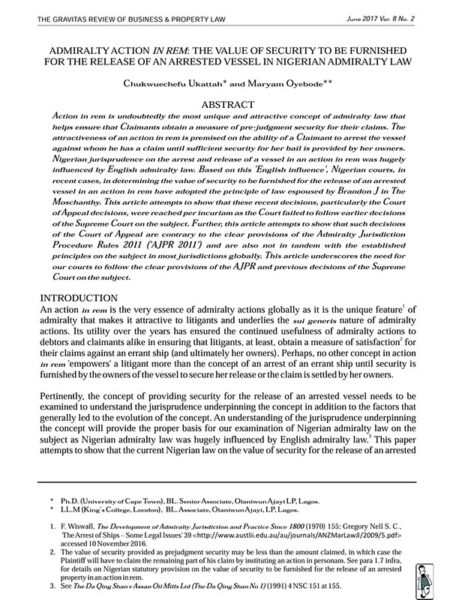
Admiralty Action in Rem: The Value of Security to be Furnished for the Release of an Arrested Vessel in Nigerian Admiralty Law
0₦2,500.00Dr Chukwuechefu Ukattah and Maryam Oyebode, Associates at Olaniwun Ajayi LP in their article “Admiralty Action in Rem: The Value of Security to Be Furnished for The Release of An Arrested Vessel in Nigerian Admiralty Law”, argue that an important attractiveness of an action in rem is the ability of a Claimant to arrest the vessel against whom he has a claim until sufficient security for her bail is provided by her owners. There have been discordant tunes among the courts on the value of the security to be furnished for an arrested vessel. The article argues that recent decisions by the Nigerian Court of Appeal, heavily influenced by the decision of Brandon J in the English case of The Moschanthy, were reached per incuriamas the Court failed to follow earlier decisions of the Supreme Court on the subject, and are contrary to the clear provisions of the Admiralty Jurisdiction Procedure Rules 2011.
-

Admissibility of Public Documents and Photocopies of Certified True Copies of Public Documents
0₦2,500.00Professor Joseph Abugu, SAN, in this article, Admissibility of Public Documents and Photocopies of Certified True Copies of Public Documents, examines two critical vexed issues on the admissibility of public documents. The first interrogates what qualifies as a public document within the provisions of the Evidence Act 2011. The second addresses the admissibility of photocopies of certified true copies of public documents. Professor Abugu posits that the essential quality of a public document must be ascertained by a conjunctive reading of sections 102 and 104 of the Evidence Act which specifies that the document must be one being kept under legal obligation by a public authority with open access by members of the public who seek to obtain a copy thereof and that routine communications of government agencies and statutory bodies do not so qualify. He also finds that the current exposition of the law on the admissibility of photocopies of certified true copies of public companies is as articulated in the 1969 decision of the Supreme court in Minister of Lands v. Azikiwe (SC) as applied in Ogboru v. Uduaghan (CA) and affirmed by the Supreme Court in Emeka v. Chuba-Ikpeazu & Ors. and in Oboh & Anr v. FNL Ltd.
-
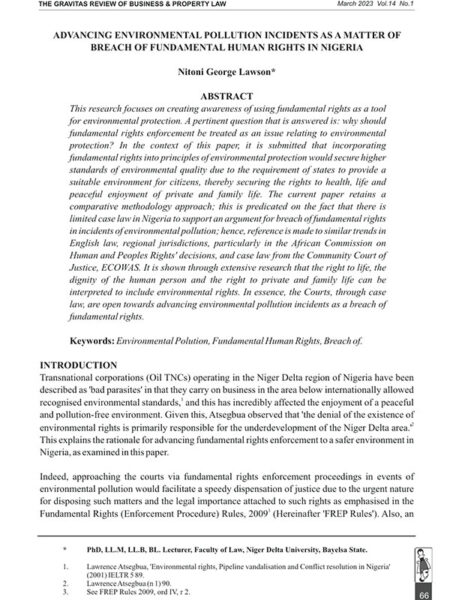
Advancing Environmental Pollution Incidents as a Matter of Breach of Fundamental Human rights in Nigeria
0₦2,500.00Nitoni George Lawson in his article, Advancing Environmental Pollution Incidents as a Matter of Breach of Fundamental Human Rights in Nigeria focuses on creating awareness on the use of fundamental rights as a tool for environmental protection. A pertinent question that is answered is: why should fundamental rights enforcement be treated as an issue relating to environmental protection? Lawson submittes that incorporating fundamental rights into principles of environmental protection would secure higher standards of environmental quality due to the requirement of states to provide a satisfactory environment for citizens, thereby, securing the rights to health, life and peaceful enjoyment of private and family life.
-
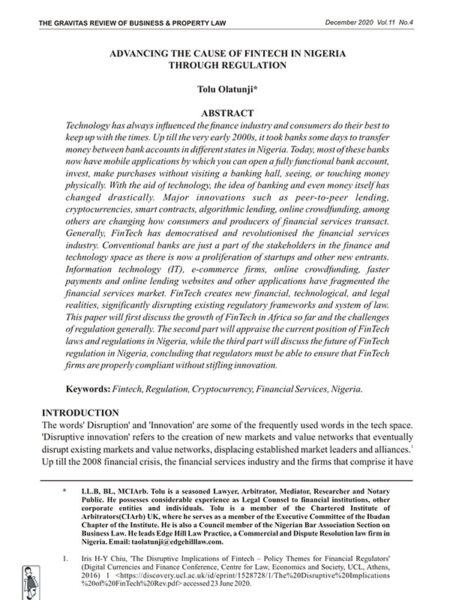
Advancing the Cause of Fintech in Nigeria through Regulation
0₦2,500.00Tolu Olatunji of the Edge Hill Law Practice in his article, Advancing the Cause of Fintech in Nigeria through Regulation, comprehensively considers the regulatory framework for Fintech in Nigeria. He appraises the growth of Fintech in Nigeria and Africa, regulatory and industry sandboxes and the challenges of regulation. He concludes that regulators must ensure compliance with regulations without stifling innovation.
-
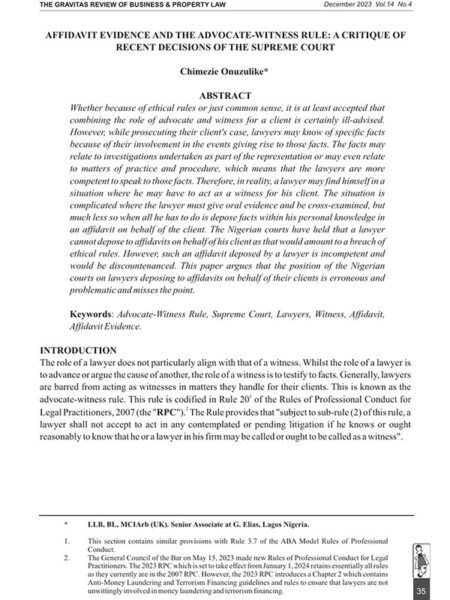
Affidavit Evidence and The Advocate-Witness Rule: A Critique of the Recent Decisions of the Supreme Court
0₦2,500.00Chimezie Onuzulike, in his article, Affidavit Evidence and The Advocate-Witness Rule: A Critique of the Recent Decisions of the Supreme Court, examines the ethical issues arising when counsel combines the role of advocate and witness for a client. Onuzulike posits that in the course of prosecuting their client’s case, lawyers may know of certain facts because of their involvement in the events giving rise to those facts. The facts may relate to investigations undertaken as part of the representation or may even relate to matters of practice and procedure, which means that the lawyers are more competent to speak to those facts. Therefore, in reality, a lawyer may find himself in a situation where he may have to act as a witness for his client. The situation is complicated where the lawyer is required to give oral evidence and be cross-examined, but much less so when all he has to do is depose to facts within his personal knowledge in an affidavit on behalf of the client. The Nigerian courts have not only held that a lawyer cannot depose to affidavits on behalf of his client as that would amount to a breach of ethical rules, but also that such an affidavit deposed to by a lawyer is incompetent and would be discountenanced. Onuzulike argues that the position of the Nigerian courts on lawyers deposing to affidavits on behalf of their clients is erroneous, problematic and misses the point.
-
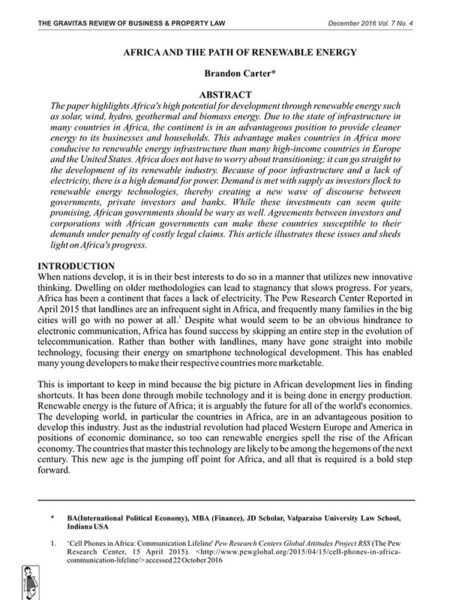
Africa and the Path of Renewable Energy
0₦2,500.00Brandon Carter, international political economist and JD Scholar, Valparaiso University Law School, Indiana USA in his article “Africa and the Path of Renewable Energy” highlights Africa’s potential for development through renewable energy such as solar, wind, hydro, geothermal and biomass. Just as countries in Africa skipped the transition to landlines in the telecommunications industry, he posits that Africa’s poor energy infrastructure deficit is an opportunity to leapfrog fossil fuel energy to clean renewable energy. While prospecting for foreign investments to fund renewable energy projects, he cautions African countries against Bilateral Investment Treaties (BITs) with Europe and the US especially those under the International Centre for the Settlement of Investment Disputes (ICSID) and advocated South-South BITs which are less skewed against capital importing countries.
-
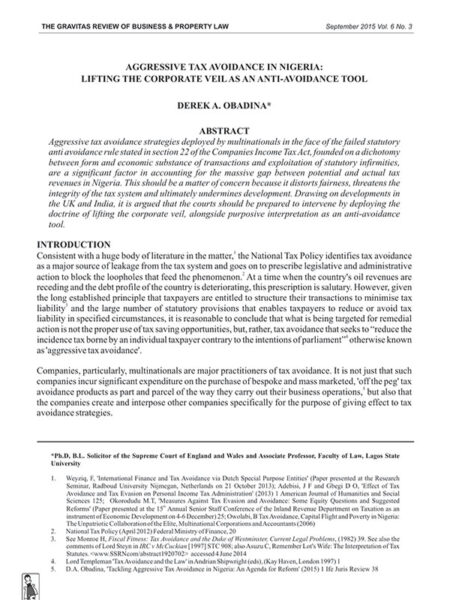
Aggressive Tax Avoidance in Nigeria: Lifting the Corporate Veil as an Anti-Avoidance Tool
0₦2,500.00Derek Obadina, Associate Professor of Taxation, Lagos State University, in his article “Aggressive Tax Avoidance in Nigeria: Lifting the Corporate Veil as an Anti-Avoidance Tool” examines tax avoidance and the deployment of corporate veil lifting as an anti-avoidance tool.
-

Aggressive Tax Avoidance Scheme: The Emergence of the Continuous Distortion of the Fine Line Between Tax Avoidance and Tax Evasion
0₦2,500.00Isaiah Akano in his article, Aggressive Tax Avoidance Scheme: The Emergence of the Continuous Distortion of the Fine Line Between Tax Avoidance and Tax Evasion, explores the thin line between Tax Avoidance and Tax Evasion. Tax is one of the major sources of revenue of the government in Nigeria. As a matter of fact, at the inception of the year 2024, the Federal Government tasked the Federal Inland Revenue Service to generate a whopping sum of N19.4 trillion which amounts to about sixty percent increase from the sum of N12.3 trillion generated by it in 2023 in a bid to raise the overall government revenue as a percentage of the Gross Domestic Product (GDP) to 25% . The revenues are meant to be generated from individuals, companies and other legal entities through tax. Hence, there is a need for citizens and corporate bodies to arrange their affairs in such a way that they can attract a minimal tax, especially in view of the harsh economic condition in the country, high inflation rate, the weak value of the naira and high interest rate on loans which most businesses resorted to, as their major source of capital. Tax lawyers, Accountants and other tax consultants had at different times proffered different ‘tax avoidance schemes’ to their clients. Some of the Schemes are aggressive and complex in nature and there are instances wherein they were eventually interpreted by the Court to amounting to tax evasion. Akano seeks to take a critical look at the line of differences between tax avoidance and tax evasion and also discuss the continuous distortion of same as a result of the advent of aggressive tax avoidance schemes in recent years.
-
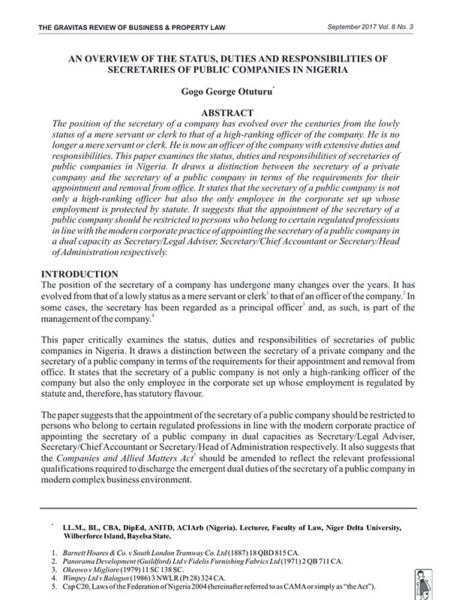
An Analysis of the Powers of the Corporate Affairs Commission in Investigation of Companies
0₦2,500.00Professor Abiodun Amuda-Kannike SAN, in his article, “An Analysis of the Powers of The Corporate Affairs Commission in Investigation of Companies” considers the enormous powers of the Corporate Affairs Commission under the Companies and Allied Matters Act to investigate the affairs of any company it suspects of being run detrimentally to the interest of its members, or of the general public. He gives a background to the investigative powers of the Commission, practical steps to be taken to trigger an investigation, and the legal value of a report prepared by an inspector appointed by the Commission.
The Gravitas Review of Business & Property Law


